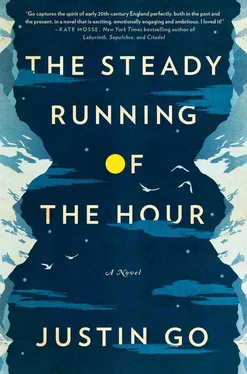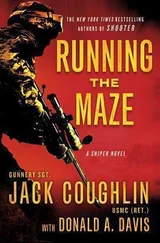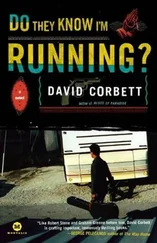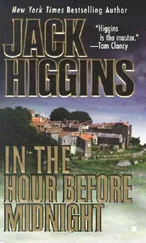Ash and half-burned paper, the canvas lining blanketed with powdery soot. A few cloth-bound books: Scrambles in the Alps, The Spirit of Man: An Anthology . The spines creak and snap as I flip their pages. I take a breath.
Beside the books there is a bundle of charred envelopes. Some are blackened on the corners, others all but burned. 2nd Lieut. A.E. Walsingham, 1 Batt. Royal Berkshire Regt., B.E.F., France. Ashes flake off my fingers as I open the envelope and unfold the sheet inside. The letter is written in a peculiar blue-black script: long and florid capitals, frequent dashes of varying length, elaborate ampersands. It is dated October 17, a few weeks before Ashley was wounded.
Dearest —
Eleanor & I went to the London Library today. I picked a tall stack of volumes, but sitting down to them, found myself asleep before ten pages were read. I dreamt of wondrous things — the stave church at Urnes I told you of, but the famous portals were yet uncarved, so you drew out your knife & we shaped them together — you carving one creature & I the other, their bodies linked fast. You lopped off a piece of the portal as a Souvenir for me, and told me to guard it well, for we were now as joined as two souls could be. Then the carillon tolled, for it was time for us to enter the church, but when you put your hand on the door — I awoke.
So I bade good-bye to Eleanor & strolled along the Embankment. Surely, I thought, even this most English of rivers flows to the sea & then towards you. On the pavement I watched a tramp draw, in chalk, the most exquisite replica of a Delacroix, only to be washed away by a rain that began to fall. Having no shilling, I gave him a ring from my own finger as recompense. He at first refused it, but I explained the ring had been an unwelcome gift, and I was richer without.
Of your question — of an Engagement — you already hold me by far more tender strings, and they are no less binding. Can you love me so much — Without — for just so long? For ten times so long? We shall not speak of wills, even gold or silver. Without you all should become lead, and would be no gift to me. I would lose more than any widow ever had. They lost husbands — I would lose my morning star, not yet risen.
Of Promises — the greatest I can fathom — I give myself to you, not in the tired rites of civilization, but through my own Design — as if love had never been before, and so I made it just for you.
Imogen
I try to refold the sheet, but my hands are shaky and it breaks at the crease. I put the letters back in the trunk and carry it down the ladder. The old man nods approvingly.
— You should take it.
— But you’ve kept it all this time.
I open the lid to show the contents, but the old man dismisses this with a sweep of his hand. He tells me he has enough old papers of his own without the need for old papers in a foreign language.
— When I’m gone my niece will just throw it out.
Desmarais descends the staircase at a crawl. I swing the attic door shut and bring the trunk downstairs, setting it on the living room carpet. The old man lowers himself into his armchair and switches on the television with a remote control.
— The news will be on soon, he remarks.
Mireille comes in carrying a tray with three mugs of tea.
— It took forever to light the stove—
Mireille looks at the trunk. She looks back at me. Her mouth is open.
— Tu as trouvé quelque chose?
Desmarais grins. — He did. And now we will drink tea, just like the English.

23 November 1916
SS Invicta
English Channel
The journey back from France was dreadful. After the quarrel with Ashley, Imogen left the cottage at Laviéville and spent a terrible night confined to a hotel east of Amiens, watching the train of refugees flow past on the muddy road. She had not eaten since breakfast and all the restaurants were closed, so she sent the elderly porter out to search for food. He came back half an hour later dripping wet with only a small round pain de campagne gripped under his overcoat. It was wet and flecked with dirt. Imogen tipped the porter and chewed the loaf greedily in bed, listening to the rumble of guns in the darkness.
She spent the second night at a dirty hotel in Boulogne waiting for a ferry the next morning, stir-crazy but also fearful of leaving her room. She drew a bath but the hot water went out halfway through and she sat paralyzed in the lukewarm tub, too weak to move, too cold to stay, wondering if Ashley had been harmed in the bombardment, wondering what reason she had to return to England at all. She put her hand to her stomach under the water and decided the swelling had started after all. But a moment later she changed her mind.
Imogen dunked her head under the bath. She listened to the humming silence of the water against her eardrums, the soft ping of her bracelet on the enamel tub as she pictured continents they might escape to: sun-bleached fields with horizons twice as wide as they had ever known. She stayed in the bath until her teeth began to chatter.

Imogen boards the ferry in the morning. The sky is gray and blustery, the sea in the Channel very rough, the few passengers on deck searching the choppy waves for signs of U-boats. The only other woman is a stout nurse in the khaki uniform of the nursing yeomanry. She leans against the rail beside a life preserver, scanning the ocean with a set of field glasses. She invites Imogen to have a look. Imogen obliges, but she sees only the same dark water, the same white froth magnified to ten times the size. It makes her dizzy.
The woman lowers her voice. The mast and the cables of the ship’s derrick sway high above her cap.
— Heard about the Britannic ?
— Pardon?
— Sunk yesterday in the Mediterranean. Along with God knows how many souls. Imagine, there could be a U-boat under us at this very moment, or a mine—
Imogen thanks the woman and hands back the field glasses, continuing along the promenade deck toward the stern. The nausea has come back and she does not know if it is the ship or the child or Ashley or everything put together. She goes to the ship’s doctor, but he is too busy attending wounded soldiers to see her. A sympathetic nurse gives Imogen a bottle of patent medicine for seasickness. It tastes of bitter herbs and alcohol and syrupy mint, and Imogen goes back on deck feeling worse than ever, the horizon pitching and rolling, the air thick with cold spray, black smoke pouring from the twin funnels above her. She grasps the railing and watches the swells break against the ship’s hull.
It had all gone wrong. For weeks she had fretted away long nights in stark terror of Ashley’s death, picturing how it might come to him in a bullet or a bomb, wondering if she would feel the smallest tremor in the ground, a rustling in the grass. But when the catastrophe finally arrived there had been no tremor, no warning, because in going to France she had somehow mangled the one thing she was trying to save. And he had mangled it too.
For it hadn’t only been Ashley in danger, Imogen suddenly realizes. They could all be brought under the waves of chance, their whole being submerged in an instant. It could happen to anyone on land or sea: the gold-braided naval officers on the navigation bridge, the ladies at tea in Mayfair and Belgravia, the art students sketching the Velázquez at the National Gallery. Even the frock-coated gentlemen in gray suede gloves walking through the solid doors in Whitehall that were never locked, the War Office and the Admiralty from which the whole empire was directed — they were all weaker than they knew, so much weaker. For nothing was certain, least of all the things one counted on to survive.
Читать дальше













